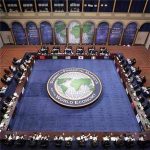 A crisis is not a good time for seeking alternatives to the US dollar. Most likely, the dreams about new regional currencies will be put aside. The countries, which originally supported those ideas, gradually change their minds. The United Arab Emirates refused to participate in the Arab currency union. The expansion of the euro zone is not likely to happen in the nearest future. The Russian ruble is no longer ambitious either.
A crisis is not a good time for seeking alternatives to the US dollar. Most likely, the dreams about new regional currencies will be put aside. The countries, which originally supported those ideas, gradually change their minds. The United Arab Emirates refused to participate in the Arab currency union. The expansion of the euro zone is not likely to happen in the nearest future. The Russian ruble is no longer ambitious either.
The subject of new alternative reserve currencies appeared when the crisis was gathering pace. Numerous publications reported about the possible introduction of the new currency in North America, the Amero. The Russian government put forward the idea to make the Russian ruble become a regional reserve currency too.
It seems that the subject of new currencies has been pushed into the background now. Many experts said that it would be extremely difficult and even impossible to launch such massive projects during the time of the crisis.
Official spokespeople for the foreign ministry of United Arab Emirates stated Wednesday that the nation would not be a part of the currency union in the Gulf, RIA Novosti news agency reports.
The decision to establish the Arab currency zone was made several years ago by Saudi Arabia, the United Arab Emirates, Kuwait, Bahrain, Qatar and Oman. Oman has already pulled out from the agreement. The UAE’s refusal to participate in the currency union of the Persian Gulf weakens the monetary unity of the Arab countries of the region.
The decision is based on purely economic reasons for there are no political differences between the countries. The refusal to take part in the union is most likely connected with the economic crisis. It is worthy of note that many key issues – the budget deficit restriction, the inflation rate and many other macroeconomic indexes – remain unsolved.
The euro, for example, retains its current position owing to the fiscal discipline of the members of the European monetary union. The countries of the euro zone observe the stability and development agreement, which restricts budget deficits (three percent of the GDP is the maximum) and sovereign debts (60 percent of the GDP) of the members of the currency bloc. That is why the present members of the euro zone were highly skeptical about the expansion of the European Union under the conditions of the crisis.
The euro was introduced to simplify the turnover of commodities between the European states: together these countries make a self-sufficient region. Unlike Europe, the Arab states are focused on the export of their products to the West and to Asia. Therefore, the introduction of the joint currency may not produce the desired effect.
sursa: pravda.ru












Adauga comentariu